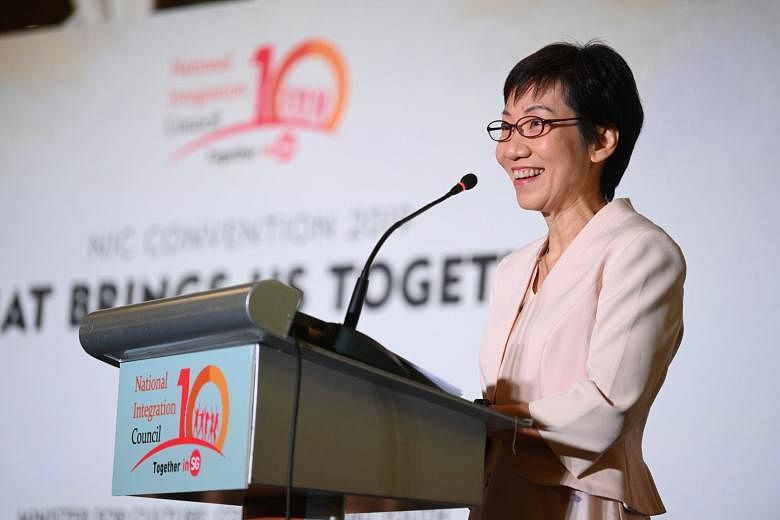SINGAPORE - Most Singaporeans accept the importance and value of having immigrants, but many also feel that immigrants are not doing enough to integrate into society.
These were some of the findings of a study made public at a National Integration Council (NIC) event on Saturday (Aug 3), where the issue of racial enclaves was also discussed.
Nearly nine in 10 (87 per cent) of the citizens and permanent residents surveyed in the study by the Institute of Policy Studies (IPS) and racial harmony advocacy group OnePeople.sg agreed that there is "a lot to learn" from the immigrants' cultures.
A similar proportion (90 per cent) said it is good to have people of different nationalities living in the same neighbourhood. Most of those surveyed (72 per cent) also like meeting and interacting with new immigrants.
But 67 per cent said immigrants are not doing enough to integrate into Singapore.
The findings were shared by IPS senior research fellow Mathew Mathews. In his opening address, Dr Mathews said that comfort levels towards new Singaporeans originally from other countries have mainly been stable.
He also highlighted key challenges in integration, such as the perception of differential treatment and differences in norms and values.
The IPS-OnePeople.sg study polled 4,015 citizens and PRs between August last year and January this year, asking for their views on race and religion in 10 areas such as discrimination and level of comfort towards other races.
The study's findings on race and religion were released last month. It found that more Singaporeans now have close friends of another race compared with five years ago, and they are also more trusting of those from different races or religions.
But the study also showed more individuals from minority groups perceiving workplace discrimination, like when applying for jobs.
Speaking on the sidelines of Saturday's event, Dr Mathews said he does not see any "major interaction" between these results and those on attitudes towards immigrants.
"The results on race and religion provide a backdrop that (integration) is not something that is easy. Even among locals there are differences and certain things can exaggerate them," he said.
On the finding that many Singaporeans do not think immigrants are doing enough to integrate, Dr Mathews suggested this could be an issue of perception and visibility.
"In general we don't really see the contributions of immigrants, for example participating in community work or associations," he said.
Minister for Culture, Community and Youth Grace Fu, who chairs the NIC, was the guest of honour at the event held at the InterContinental Singapore hotel, where she spoke to around 190 guests from community groups and immigrant associations.
"Integrating locals and newcomers in our society is an ongoing journey and is part of our evolution as a young nation," said Ms Fu.
In her speech, she also highlighted three integration challenges. First, as the Singaporean identity has become stronger, it has also become easier to observe differences rather than commonalities in newcomers.
Second, workers concerned about workplace competition and security in a period of technological and trade disruptions could question the need for newcomers.
Third, divisive narratives spread to Singapore more easily with greater connectivity and social media.
At a discussion after her speech, Ms Fu also addressed the issue of certain racial groups being concentrated in certain residential estates, saying that the NIC is studying this regularly.
She was responding to comments from a member of the audience, who asked how to get immigrants to engage locals when some of the immigrants mingle only among themselves in certain private estates. He also referenced the Ethnic Integration Policy (EIP) for public housing, which specifies the proportion of units in a Housing Board block and precinct that can be owned by a particular racial group.
Ms Fu said that private properties are a "whole different ball game altogether".
"There needs to be some property sectors that are able to absorb the newcomers. If we have EIP in both public and private housing estates, where are they going to stay?"
She also noted that the goal of integration can be reached in different ways, such as through greater interaction in the workplace, as well as volunteering and community work.
"We are all in it together. If we start excluding parts of Singapore, we are not going to succeed as a society...as an economy," she said.
In her speech, she also announced a new workgroup on the Singapore Citizenship Journey, a mandatory programme for those who are about to become citizens.
The workgroup will develop content that explains our values and obligations as Singaporeans and the norms of our society, and create a common understanding of our culture and national history, she said.
It will involve both local-born and naturalised Singaporeans and aim for representative participation.
"We value your input and we invite you to participate in choreographing this journey for new members to our Singapore family," said Ms Fu.


